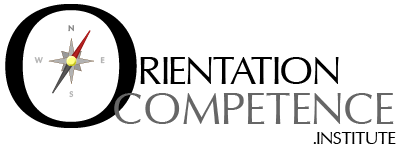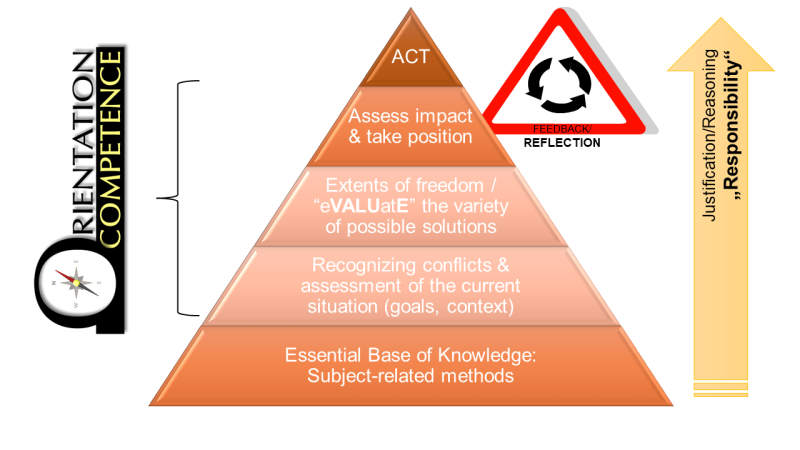Competence Transfer

To teach competence for me means …
… the targeted formation of the ability of learners to reflect on goals, facts and options, to evaluate them competently and to develop and justify their own position – which does not necessarily correspond to the domain-specific doctrine. I myself like to learn in a multimedia playful way with cases from practice as well as publications of differently opinionated authors.
Economics, Ethics & Orientation Competence
The output of economic education is in the foreground of every future-oriented learning and teaching concept. In addition to sensible subject-specific systematics of courses and teaching materials and the imparting of a basic stock of domain-specific knowledge, it is at least as important to form and strengthen basic orientation competence.
Economics and business ethics, issues of ethics and good human behavior within the realm of business and organizations – but also beyond – require orientation. Orientation, in turn, requires fixed points from which the perceived world, the knowledge foundations, and options for action can be ordered and evaluated. In order to be able to select one’s own fixed points in a self-determined way, pluralistic teaching is necessary, which equally takes into account the global diversity of world views and doctrinal opinions. The same applies to independent learning! In the economic canon of subjects, specialization and narrowing of areas of knowledge often takes place in teaching, so that they become manageable (reduction of complexity). In each case, only specific perspectives, only certain aspects of a section of reality are taken into account. Therefore, the embedding in structural, normative and cultural frameworks often has to be done additionally. Problems that are not fully covered by a discipline can neither be explored from within it nor formulated holistically. The limits of the discipline are here the limits of knowledge and precisely also of teaching and individual learning.
Only with the competence to orient oneself, to formulate values in the sense of “wanting” and to recognize standards in the sense of “ought” and thereby to be able to show the right way for the self and the other, responsibility is possible. Responsibility in the sense that an individual answer can also be given beyond domain-specific – in our case business administration, economics and management – justifications, which clarify the sense of the chosen alternative course of action.
Since university education shapes potential leaders, who in turn have a very significant impact on their environment and our society in their future sphere of action, it is very important to form the ability to reflect on and evaluate goals, facts, options, values and morals and to develop and justify one’s own position – which does not necessarily correspond to the domain-specific doctrinal opinion. To be able to select standards independently and consciously, to make decisions value-oriented, to justify and answer for them and finally to give orientation to third parties are competences that are as essential for self-leadership as for the leadership of others. Important for coping with highly dynamic, future requirements in a complex world is therefore …
– … the ability to place one’s own professional and entrepreneurial actions in the context of the global society as a whole,
– … knowledge of current conditions and structures and their relationships and interactions,
– … understanding of past developments and decisions,
– … the evaluation of various alternative actions on the basis of one’s own and others normatively justified perspectives,
– … an eye for interdependencies as a prerequisite for the sustainable design of global societies.
In the field of economics, business ethics know-how is responsible for the fact that this orientation competence grows during the course of studies. Orientation competence enables students to ask decisive questions that make responsible action possible:
1. What do we need to know professionally in order to view a problem area holistically ?
2. How can we define the current problem/future challenge ?
3. Which solutions are possible & which values are guiding each solution ?
4. Which values guide MY decision & what are the consequences ?
5. What is my concrete action to face the problem ?
Economics and business ethics have long been one. Economists always asked philosophical and theological questions about man and his socialization. Psychological aspects were as important as ideological, cultural, spiritual and ethical aspects. Ethics was lost to economists for a time in favor of an almost excessive mathematization of the profession. But recent major economic crises have again highlighted this loss. Let us work to ensure that this does not happen again …
Teaching Philosophy
The basis of my teaching philosophy, in addition to the focus on competencies as indicated in the European Qualifications Framework for Lifelong Learning, is the promotion of orientation competence as described above. Only with the ability and awareness to orient oneself on a transparent basis in changing dynamic environments, responsibility becomes possible. This allows students to give direction to themselves and to third parties and to articulate it competently. The following elements are the fundamental basis of my course structure in a didactically adapted sequence:
- Self-introduction (transparency of professional and normative character of all individuals involved in the learning experience)
- Linking to previous courses (recapitulation of core content)
- Importance and meaning of the topic, topicality and individual concern
- Prior knowledge tests (connection options for constructivist learning)
- Teaching/learning objectives + availability of teaching material
- Theory base exploration
- Application model(s)
- Empirical & case studies + interactive elements for application of models
- Outlook with possible research questions for thesis
- Summary of key points (learning objectives and, if applicable, examples of examination forms)
Teaching material & digitalization
All courses will have massive digital teaching materials. In addition, relevant recordings from classroom lectures (blackboard notes, flipcharts, moderation results from group work, …) are digitized and added to the existing digital teaching materials. Important sources are basically accessible by few clicks and are provided in the university library.
Where didactically appropriate, core teaching sequences are recorded and multimedia blended learning units are prepared for individual recapitulation and/or flipped classroom approaches. In the case of flipped classroom approaches, the overall workload in line with the curriculum is closely observed so as not to create additional workload for students. Since 1999, I use digitization specifically to generate didactic and pedagogical added value or additional benefits in the teaching/learning process. Every new technology will be evaluated for possible benefits in the learning process and respectively used!

